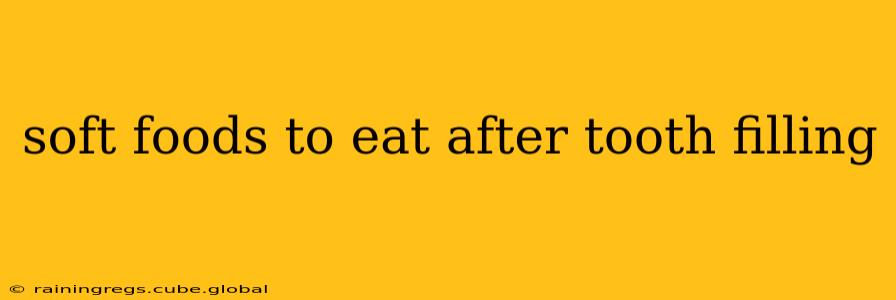Getting a tooth filling can be a bit uncomfortable, and knowing what to eat afterward is crucial for a smooth recovery. This guide provides a comprehensive list of soft foods perfect for the days following your dental procedure, ensuring both comfort and proper healing. We'll also address some frequently asked questions to alleviate any concerns you may have.
What Should I Eat After Getting a Tooth Filling?
The key is to consume foods that require minimal chewing and are gentle on the sensitive area around your filling. Avoid anything crunchy, hard, or sticky that could dislodge the filling or irritate the surrounding gums. Focus on foods with a soft texture and lukewarm temperature.
Here are some excellent options:
- Soups: Broth-based soups, creamy tomato soup, or lentil soup are all fantastic choices. Make sure they aren't too hot!
- Yogurt: Plain yogurt or yogurt with fruit puree is a great source of protein and probiotics, which are beneficial for overall health.
- Applesauce: Unsweetened applesauce is a soft, easily digestible option.
- Mashed Potatoes: Plain mashed potatoes, ideally without any hard bits of potato skin, are a comforting and nutritious choice.
- Scrambled Eggs: Softly scrambled eggs are gentle on the teeth and provide essential protein.
- Oatmeal: Cooked oatmeal, especially the creamy kind, is easy to eat and provides fiber.
- Smoothies: Blend fruits, vegetables, and yogurt for a nutritious and refreshing option. Avoid adding ice, which could be too hard on your teeth.
- Pureed Foods: Consider pureed vegetables or fruits like carrots, peas, or bananas for a smooth texture.
- Pasta: Well-cooked pasta, particularly softer varieties, can be included in your diet. Avoid anything with hard, crunchy sauce toppings.
- Pudding: Creamy pudding, especially rice pudding, is a soft and easy-to-eat dessert.
What Foods Should I Avoid After a Tooth Filling?
To ensure your filling stays in place and your mouth heals properly, avoid these foods in the days following your procedure:
- Hard Foods: Avoid hard candies, nuts, popcorn, chips, and hard pretzels. These can damage or dislodge your new filling.
- Sticky Foods: Sticky foods like caramel, taffy, and gummy candies can pull on the filling and potentially cause it to come loose.
- Tough Foods: Steer clear of steak, tough meats, and other foods that require excessive chewing.
- Extremely Hot or Cold Foods: While lukewarm foods are ideal, avoid extremes in temperature, as these can cause sensitivity.
How Long Should I Eat Soft Foods After a Tooth Filling?
Generally, you should stick to a soft food diet for at least 24 hours after your filling. However, your dentist might recommend a longer period depending on the size and location of the filling, as well as your individual healing process. It's always best to follow your dentist's specific instructions.
Can I Eat Normal Food After 24 Hours?
After 24 hours, you can gradually reintroduce harder foods into your diet, but proceed with caution. Start with slightly firmer textures and monitor for any discomfort or sensitivity. If you experience any pain or notice any issues with your filling, contact your dentist immediately.
What if My Filling Feels Loose?
If you feel your filling is loose or if you experience any pain, swelling, or prolonged sensitivity, contact your dentist immediately. This is important to address any potential complications before they worsen. Early intervention is key to successful healing and maintaining the longevity of your filling.
Are There Any Nutritional Considerations?
While focusing on soft foods, try to maintain a balanced diet. Include plenty of fruits, vegetables (pureed or soft cooked), proteins, and healthy carbohydrates to support your overall recovery. Staying hydrated is also crucial for healing.
Remember, this is a general guide. Always follow your dentist's specific post-operative instructions. By following these guidelines, you can ensure a comfortable recovery and the longevity of your new tooth filling.
